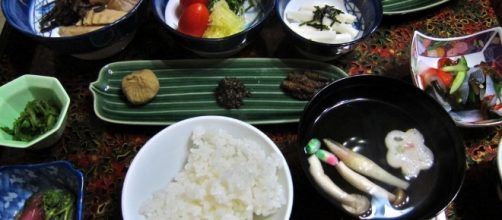As health becomes increasingly important in the modern world, more people have adopted a vegetarian diet. The western world, especially the United States and Canada, has become used to catering to different needs, diets, and allergies. This isn’t the case in many places, and it certainly isn’t the case in Japan. While it can be very frustrating to be Vegetarian in a country where you do not speak the language, it isn’t impossible. Here are the top 3 tips I learned while in Japan.
Learn some Japanese
On your phone or a piece of paper, make a list of key words and phrases important in everyday life.
Practice these phrases before and during your trip to make communication as easy as possible.
There technically isn’t a word for vegetarian in Japanese, and while some people have adopted the English word, pronounced “bejitarian,” not everyone will understand you. Before you sit down at a restaurant, try telling the host “Watashi wa bejitarian des,” which translates to “I am a vegetarian.” If they don't understand, be more specific and tell them “watashi wa niku toh sakana wo taberarimasen,” which translates to “I don’t eat meat or fish.”
Try being flexible
The most difficult part of being a vegetarian in Japan is avoiding “Dashi.” This fish stock is commonly made by boiling dried kelp and dried tuna and is in nearly every dish.
During my travels, the vegetarians in my group decided to make an exception to include dashi in our diets while traveling in order to broaden our options. While it is hard to avoid, it’s not impossible. Tell your host “Dashi to katsuobushi wa taberaremasen,” which means “I can’t eat dashi or bonito fish flakes.” Keep in mind that custom orders aren’t the norm in Japan. Many places will not leave a single ingredient out or substitute it.
Plan ahead
Before your trip, search for vegetarian restaurants. There you will be guaranteed a meat and fish-free meal. When vegetarian restaurants do not seem to be an option, keep an eye out for Indian restaurants, as they tend to have meatless options.
Look for Zen Buddhist temples for vegan meals.
If you visit Kyoto, you won’t want to miss out on these. The ancient city has thousands of temples and shrines, and the deep culture of Zen Buddhists in the area means almost all restaurants have vegetarian and vegan options.
Plan to stay at Ryokan Inns. These are traditional Japanese-style inns and can be very affordable. They provide meals, and, if you call ahead of your stay, you can ask for a vegetarian option.
Whatever you do, don’t forget to enjoy the beauty and rich culture of Japan.


